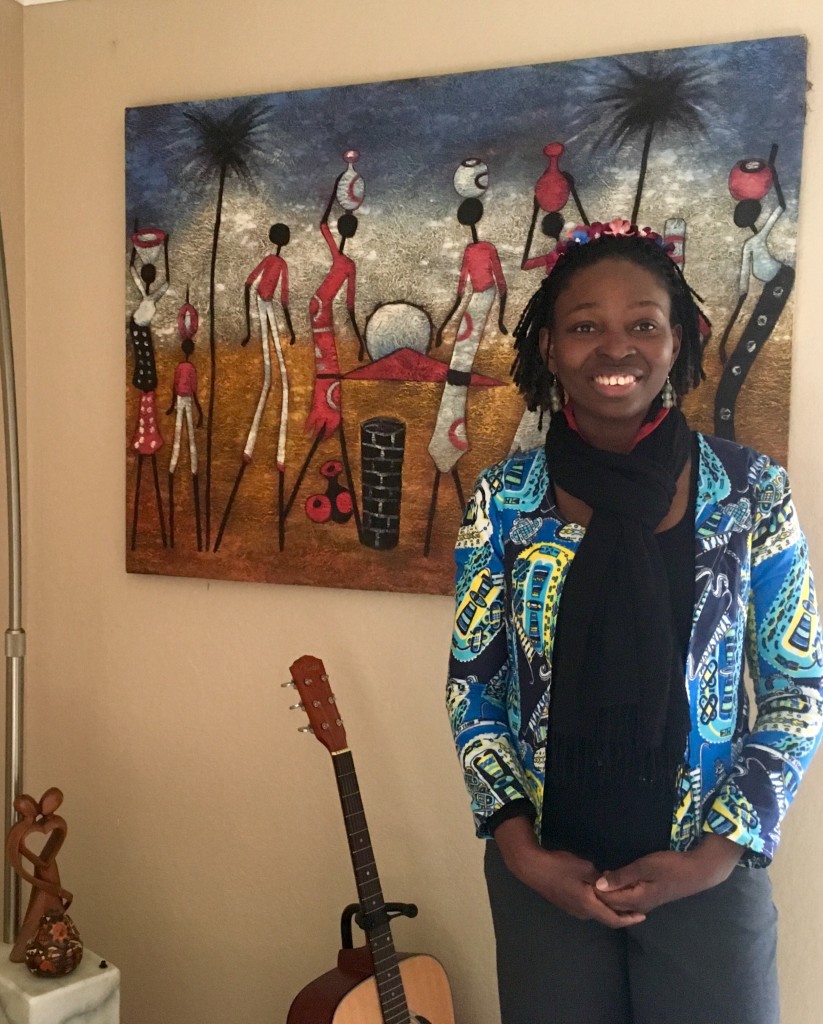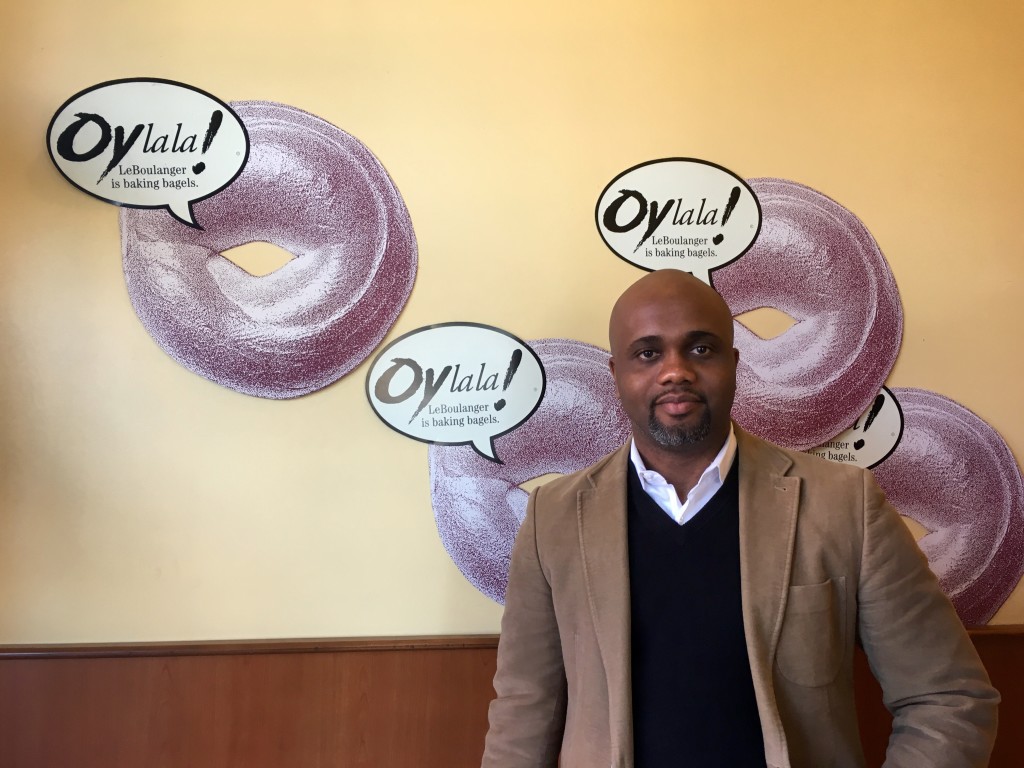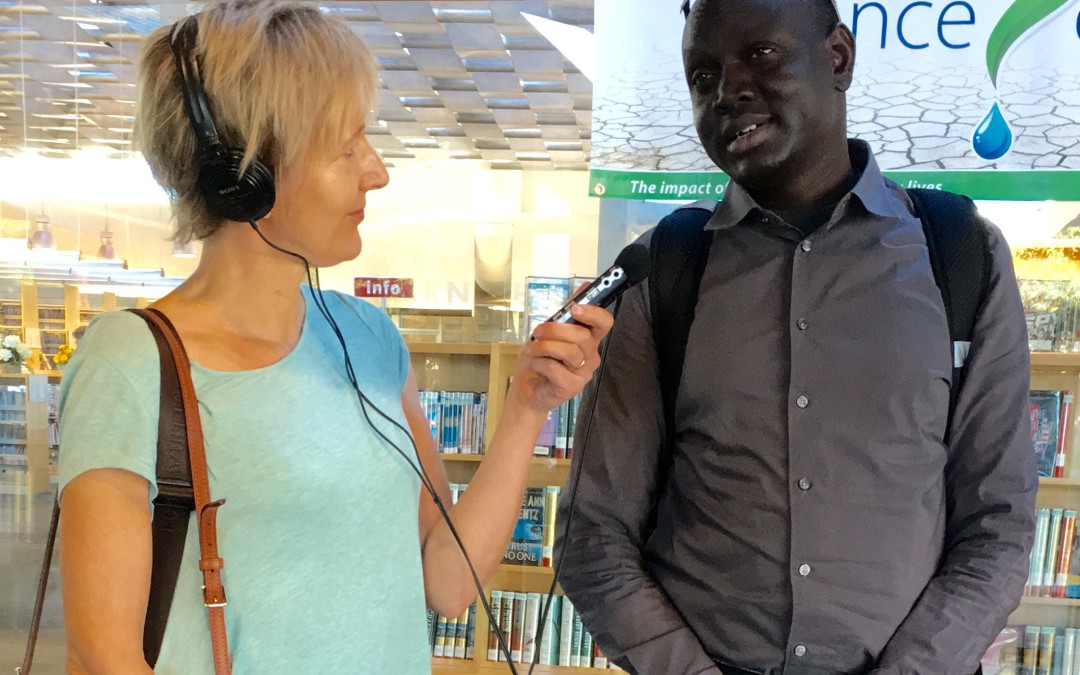By Alison van Diggelen, host of Fresh Dialogues
Immigration – it’s a hot button issue in this year’s U.S. presidential race. I was delighted when my senior editor at the BBC gave me this fascinating assignment: find some African immigrants in Silicon Valley, explore the cultural chasm they’ve crossed and how they keep close ties – both economic and emotional – to their homelands. What do friends back home think of life here in the United States? Cameroonian, Marie-Ange Eyoum described it thus:
“They look at the U.S. as heaven, they believe they’ll have more opportunity, be much more successful…” Marie-Ange Eyoum
But of course, it’s not all fun and games. Gabriel Tor (who was one of the Lost Boys of Sudan) works two jobs to help support eleven family members back home. He reckons he’ll have to work through retirement to pay off his $20,000 college loan.
This week, I joined the BBC’s Roger Hearing on the World Service’s Business Matters program. Here’s a transcript of our dialogue and my report (edited for length and clarity):
Listen to the BBC podcast here (Feb 10, 2016 Podcast titled “Twitter Disappoints” – Report starts at 26:00)
Roger Hearing: Now Alison, where you are in Silicon Valley…we’ve been asking you to take a look at something quite specific – to do with the ways people from the developing world, specifically Africa, manage to find their way to work there. Now, just introduce your report for us, if you would.
Alison van Diggelen: Immigration is a very topical issue this election year in America. I focused on three Africans who’ve come here in the last 10-20 years – one from South Sudan, one from Cameroon and one from Nigeria. I wanted to explore:
How are they contributing to Silicon Valley?
How do they give back to their families in Africa?
And how do those friends and family view their lives over here?
Here’s the report: Africans in Silicon Valley

.
Africans may not be plentiful in Silicon Valley but some are making profound impacts back in their homeland. Meet Gabriel Tor. He’s one of several dozen Lost Boys of Sudan who arrived here as a refugees in the early 2000’s.
Gabriel Tor: How we live as South Sudanese…we have seen it all: how to live with something or how to live with nothing…
Tor works as a security guard and taxi driver. He has over 20,000 dollars in student debt, after completing a bachelor’s degree at San Jose State. Yet he still manages to send home about $3,000 each year to support his mother and 10 family members, exiled in Kenya (from the conflict in South Sudan.)
I ask him how long it will take to pay off his loan?
Gabriel: I think it’s going to take me up to the retirement age…I don’t have the courage to calculate the years…(laughter). I know it’s going to be a long time…it’s going to take decades to pay it off.
So what keeps him going? His brow furrows as he describes his first visit back to see his family – yet another generation forced to escape the violence that’s returned to South Sudan.
Gabriel: When I first visited, almost everybody was starving. It broke my heart.
Alison: Did you explain your tears to them?
Gabriel: To them, I had to hold my tears (back)… On the bus with other strangers, I broke into tears. It’s a situation that’s been made poorer by civil war.
Marie-Ange Eyoum also feels that tug to her homeland, in Cameroon.
Marie-Ange: I can be driving somewhere and I see the waste…how much food is being wasted, and my heart just goes back home.
Eyoum is ecstatic that she “won the lottery” – the diversity visa lottery that is – while completing her PhD in engineering (at Berkeley). Eyoum now works as a product manager for a tech company.
She goes back to Cameroon regularly to give leadership talks at universities and visit her high school, where she picks “the smartest ones” she says “mostly girls” to fund their education. So what do her friends in Cameroon think of SV?
Marie-Ange: The young people: They look at the US as heaven, they believe they’ll have more opportunity, be much more successful than in Cameroon.
Eyoum once tried to create a Leadership training startup in Cameroon but it floundered.
Marie-Ange: In Cameroon, yes doesn’t usually mean yes. No doesn’t mean no…So you kind of have to read under the line what is really happening…
Would she ever return to Cameroon? For now she feels she can make a greater difference being in Silicon Valley.
Marie-Ange: Definitely you need to be on the ground to do biz in Africa. It’s difficult being in SV. We are two oceans away, 9 hours time difference, two time zones.
I dearly love Cameroon and I would love to put in place something that would make a difference for future generations…
 .
.
Nigerian, Stephen Ozoigbo knows all about being on the ground in Africa. He went back nine times last year. In 2013 he founded an African tech foundation where he’s helping bring the Silicon Valley entrepreneurial spirit, wisdom –and funding – to Africa. We met in a busy Silicon Valley café…
Ozoigbo: Africa has the youngest people on the planet…there are so many unemployed …you throw in all of the necessary elements to an active, aspirational population and what you’ll find is a big spark, a big explosion actually…of young entrepreneurs.
Like many Africans in Silicon Valley, Ozoigbo is patient person. He knows real change takes time.
Ozoigbo: It’s a marathon, not a sprint. Silicon Valley was not built in a day… Silicon Valley had to be welcoming to this new immigrant population…
Extras (that didn’t make the final cut)
On Forgiveness
“Holding on to a painful past doesn’t help. Grudges don’t help anybody. Forgiveness can connect a lot of things and gives you peaceful living,” Gabriel Tor was one of the Lost Boys of Sudan.
On Feeling Welcome in Silicon Valley
“100% yes. I’ve never felt out of place…In Virginia…every time I speak, people would say – where are you from? I get that question in Silicon Valley but it’s an honest question (not a loaded one) – to really understand where you are from, to appreciate the culture…In Silicon Valley people say: I LOVE your accent, where are you from? They have a curiosity to see my perspective.” Marie-Ange Eyoum, Senior Product Manager at Intel.
On Africa’s Future
“Africa’s future will be reinvented on the backbone of young tech savvy entrepreneurs. The Internet has flattened a lot of things. Information is democratized. ..that will shorten the marathon race. Africa has Gatorade now, we have better running shoes and we understand our aerodynamics and can do so much better on this race and not just stick to the legacy of race running,” Stephen Ozoigbo, founder of African Technology Foundation.
Find out more
Meet more “Tech Women” entrepreneurs from Africa (Fresh Dialogues report for the BBC). What did they learn from Silicon Valley?
Find out more about Immigration Reform here




